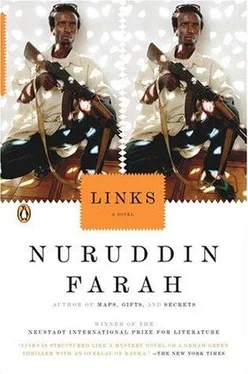“We have an emergency!” he told Jeebleh.
“Can I be of help?”
“I must be on my way to the clinic. Please arrange with Dajaal when you wish to be picked up,” Bile said. “Either later today, or tomorrow, or at the latest the day after.”
In less than ten minutes, Dajaal was at the door of the apartment, ready to escort Jeebleh to the hotel. Both Jeebleh and Bile knew that they had a lot more to say to each other, and knew too that they had time on their side.
They embraced for a long time before parting.
IN A DREAM OF THE NIGHT BEFORE, JEEBLEH KNEW WHERE THE CAPTORS were keeping Raasta and her companion — in a mud hut overlooking the noman’s-land between the two StrongMen. He was at a disadvantage, though, in that he had no transport of his own, and no one to bring him back to where he was staying, a beach cabin by the ocean. Nor did he have bodyguards to protect him in case he was attacked. Moving about was proving very difficult.
He was in an anteroom of the beach cabin, where a woman, name unknown and face unseen, lay on a mat, screaming her head off, occasionally mumbling to herself the name of the man to whom she addressed her pleas. To Jeebleh, the name sounded very much like “Caloosha.” Another woman, in a nurse’s uniform, was restraining the wailing woman and speaking to her in the patronizing tone that medical staff often use when chastising obstreperous patients. It wasn’t clear, in the dream, whether the screaming woman had attempted suicide. When he tried to find out the woman’s story and why her wrists were bandaged, an armed man in rags sealed his mouth with an asphyxiating gag. Later, after ridding himself of the gag, he tried to push his way past a bouncer with enormous sharp teeth. He was kicked in the groin for attempting to escape, and collapsed backward, in a hapless heap, groaning. He was in so much pain that he couldn’t get to his feet, and he wet himself.
AWAKE, JEEBLEH SAW THAT EVEN WITH ITS DISJOINTEDNESS AND LACK OF clarity, the dream had some highly detailed moments. He remembered the woman pleading to “Caloosha,” even though he had seen no sign of the man in the dream. He decided, on the basis of the dream, that he should seek out and solicit Caloosha’s help. Perhaps he would intercede with the hostagetakers.
But a few things in the dream raised warning signs, which worried and frightened him. A man had appeared, assigned to be his guide. He had eyes from which billows of smoke issued, and he held several lit cigarettes between his fingers. The man, a dwarf, needed to work out his daytime contradictions, and was now on stilts. He was a praise singer, and claimed that he had been commissioned to compose a panegyric for the boss of Mogadiscio’s underworld, “the fire of whose genius was unlike any other, and had no equal anywhere.” Sadly, Jeebleh couldn’t remember any of the lines, because the man whose voice reminded him of Af-Laawe had the wrong accent, his syntax was muddled, his diction lacked finesse, and his metaphors were mixed.
There were also marksmen in the dream, who took delight in demonstrating the skill of their shooting; they hit their targets lethally without breaking a bead of sweat. One of them had a mouth with baby lips that blew bubbles. At the center of the tableau was a small girl having her hair braided by her companion.
Despite his misgivings, the dream left Jeebleh with a sense of optimism, and he rose from his bed convinced that Caloosha held the key to the girls’ disappearance, and that he or one of his associates, namely Af-Laawe, knew where Raasta and Makka were being held. Quite possibly, Caloosha had helped the captors in a big way. In a moment of elation, Jeebleh believed that he would succeed in recovering the two girls from the clutches of their captors. But first he had to seek an audience with Caloosha. He would show humility, he would openly acknowledge Caloosha’s power over them all. To steel himself, Jeebleh recited two lines from a poem in Somali in which a weak man, plotting to kill a much stronger man, humbles himself before his intended victim, pretending he is a friend and no threat at all. But when the opportunity to hit presents itself, he strikes! Jeebleh would do as the poet suggested, and wait in ambush until after the girls’ release.
Shaved and showered, he took the piece of ruled paper on which Dajaal had drawn a map with directions to Caloosha’s villa. Smoothing the crumpled sheet, he followed the route with his forefinger, memorizing the sequence of turns in the road. He was sure he would find it easily, no trouble at all. He went downstairs and past the reception desk, which was unusually quiet today, to have his coffee. He moved as slowly as a chameleon going uphill.
WHILE JEEBLEH WAITED FOR HIS COFFEE, THE DAY SEEMED AS DULL-EYED AS a young elephant mourning the death of its family. The sun shone competently, its rays trudging through a thick film of dust. He sat facing the open area where, only the day before, the vultures had gathered. Today there wasn’t a single one. There was an Alsatian, though, pregnant by the look of it, and close to her, a crow, lonely-looking, brooding and quiet for much of the time.
Seeking out his tormentor was the last thing Jeebleh wanted to do. The decision to call on Caloosha was not an act of courage — it went against everything Jeebleh stood for and believed in. But the dream had strengthened his trust in the correctness of the decision. He would do all he could to help gain freedom for Raasta and Makka, even at the cost of feeling humiliated by a fool. Then he would figure out how to take vengeance on Caloosha, perhaps with help from Dajaal, to whom he intended to speak.
An only son, Jeebleh had been raised by a strong woman with iron determination. His father was a lowlife; he had sold the house the family lived in and the plot of land he had inherited from his own family to pay off gambling debts. After the divorce, Jeebleh’s mother made it her mission in life to ensure that Jeebleh grew up to be very different from his father. She impressed into his memory his uniqueness, repeatedly telling him that he could do anything he put his mind to.
She possessed no more than a brick-and-mud single-room hut, a barn with two cows and a calf tied to poles buried in the earth, an outdoor latrine, and an undying hope in her son’s future success. And even though she loved him to excess, she was firm with him. Within half a year of being divorced, she borrowed a few hundred shillings from a woman friend and started a neighborhood stall, selling tomatoes, onions, and matches spread on a cardboard box. Day in and day out, she sat on the very mat where she and her son slept at night.
One morning, two years after she had set up her warato stall, she became acquainted with a midwife living in the same neighborhood. The two women got talking, and they entered into a contract from which both would benefit. The midwife kept the oddest of hours, because of her vocation, and was away from home several days and nights at a stretch. Then she would be off work for a few days at a time. Jeebleh’s mother agreed to look after the midwife’s two sons, Caloosha and Bile, for a monthly fee. The elder of these sons was away at school until early afternoon, while the younger one, more or less Jeebleh’s age, had not started school yet.
A bright-eyed, active child, Bile was as adorable as Caloosha, his elder brother, was detestable — Caloosha, who had been born in breech position, almost killing his mother in the process. The two younger boys got along extremely well, and the midwife was pleased that her son had an ally in Jeebleh, who helped deter Caloosha from bullying his younger brother. Jeebleh trained so he could defend himself, and he tried to teach Bile, but with little success.
Читать дальше












